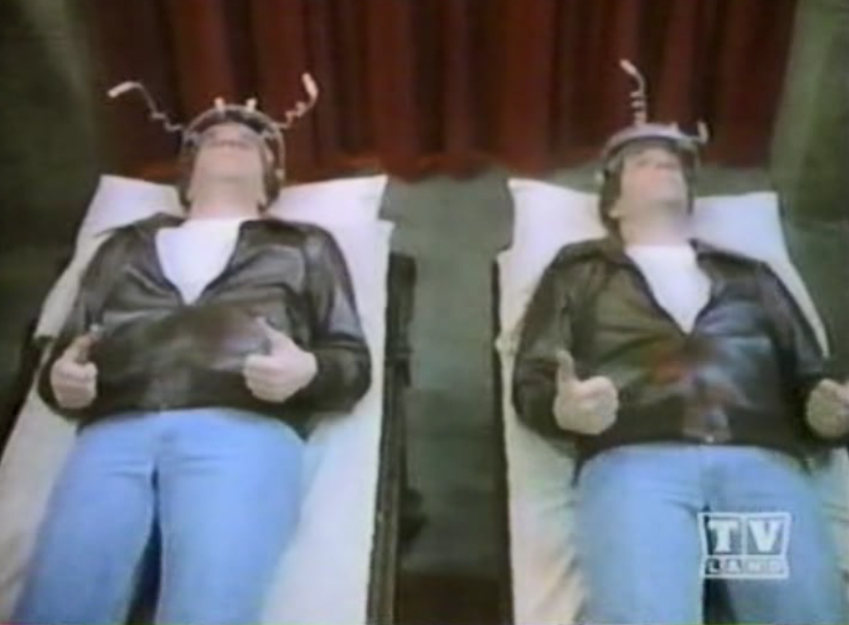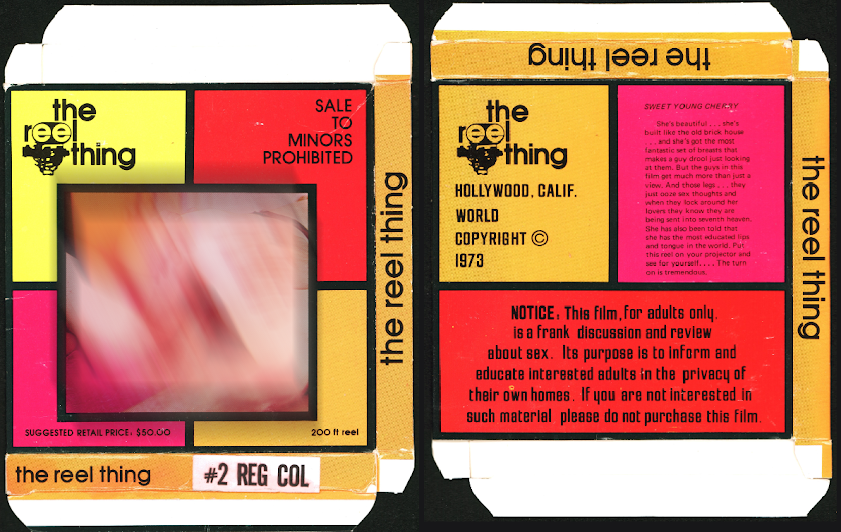 |
| A young woman contemplates her life in Ed Wood's short story, "Mandy's Mistake." |
An ambitious, young Edward D. Wood, Jr. arrived in Los Angeles from Poughkeepsie in 1947, hoping to make a name for himself in the motion picture industry. He eventually did just that, but hardly in the way he had anticipated. His fame was largely posthumous and ironic. During his own lifetime, Eddie was either scorned or utterly ignored by the movie business he loved.
By the early 1970s, having moved down from low-budget mainstream films to out-and-out pornography, Ed Wood was moonlighting as the prolific author of adult books and magazine articles. Today, let's look at another of the short stories he wrote during this period. Since it deals with a young woman who moves to Los Angeles, only to regret her decision almost immediately, this story feels very personal.
The story: "Mandy's Mistake." Originally published in Flesh & Fantasy (Pendulum Publishing), vol. 4, no. 4, November/December 1971.
Synopsis: A young woman named Mandy has just arrived in Los Angeles. She was supposed to move into an apartment in the Echo Park neighborhood with her boyfriend, Ned. To her surprise and dismay, however, Ned didn't even bother to pick her up—or even page her—at the airport. After spending a lonely night in a motel, Mandy ventures out to a coffee shop, then decides to seek out the apartment Ned was supposed to have rented for them.
Somewhat cheered by her breakfast, the young woman takes a bus to Echo Park Lake and thinks back to her most recent telephone conversations with Ned. In hindsight, he did seem a bit unenthused the last few times they talked. Once at the lake, Mandy becomes aware of a lascivious old wino who is staring at her. The man tries to strike up a conversation with her, but she is initially hesitant to speak to this "miserable" bum. Eventually, though, she does open up to him and even starts to cry as she explains her situation.
The wino agrees to help Mandy find the Beacon Street apartment she was supposed to share with Ned. Once they get there, the manager of the place tells her that Ned put a $10 deposit down on the place but never contacted him again. Since the apartment is now rented to someone else, the manager gives Mandy the $10 back, along with a slip of paper containing Ned's (possibly fraudulent) address. Mandy realizes she no longer cares about Ned and gives the money to the wino. The old man cheerfully departs with a "sexy" wink.
Excerpt: "This is what fate rewards her with, she thought, a beautiful human being like this to keep her company. Just what she needed. Yeah, like fun. She turned and looked straight into the old man’s eyes—defiantly, accusing, daringly. What right did he have to come and bother her? Men seemed to be all alike—stupid and insensitive, she thought as she continued to stare at the man, who now had developed a little tic under one eye from nervousness."
 |
| A map of the action in "Mandy's Mistake." |
Reflections: When I think about Edward D. Wood, Jr.'s experiences in Los Angeles, I can't help but think of "Midnight Train to Georgia," a 1973 smash hit by Gladys Knight and The Pips. I doubt Ed Wood kept up with the Top 40, but songs as popular as "Georgia" have a way of seeping into your life whether or not you seek them out.
As you probably remember, the song tells the story of a thwarted dreamer who decides to return home after failing to become a "superstar" in Los Angeles. ("L.A. proved too much for the man," goes the famous opening line, a sentiment Ed knew all too well.) I wonder if Eddie ever thought about taking the midnight train back to Poughkeepsie, bringing his wife Kathy back home with him as a souvenir from his time in Hollywood. She would have gone, I'm certain, just like the lady in the song does.
The title character in "Mandy's Mistake" also considers returning home after her L.A. plans fizzle. She even ponders the possibility that she never actually loved Ned in the first place. She just wanted an excuse to move to the big city, and there he was. The story ends ambiguously, so we never do find out what happened to Ned or what Mandy did with herself. Maybe she decided to tough it out in Los Angeles anyway. Hey, Ed gave it a good 30 years.
I've been treating Mandy as Ed Wood's surrogate in this story, but the author has a lot in common with the wino character as well. The way the bum is described—with his "improbable, cherubic" face and "impish" blue eyes—sounds a lot like Eddie, as do the character's disgraceful teeth. The story even hints that, like Ed Wood, our wino friend has come down a bit in society since his glory days. He casually tells Mandy that he "used to own a real estate office." Now he's a drunken bum, possibly homeless, hitting on strange women in the park. I think Ed could relate to that.
Speaking of real estate, another interesting aspect of "Mandy's Mistake" is that it mentions some genuine Los Angeles streets and landmarks. My guess is that Ed Wood was inspired to write this story after going to the actual Echo Park Lake, seeing a young woman on a park bench there, and imagining what her backstory might be.
 |
| A vintage postcard depicting Echo Park Lake in Los Angeles. |
Not being an Angelino myself—I haven't even visited in over 25 years—I'm not too terribly familiar with L.A. geography. It was easy to find Echo Park Lake on Google Maps, and it is indeed near the intersection of Echo Park Ave. and Sunset Blvd., just as Ed Wood claims in this story. I get confused, though, when Eddie describes the journey that Mandy and the wino take to get to the apartment. Here's the passage in question:
Mandy followed, and pretty soon they were walking briskly in the direction of what looked like a shopping center. She noticed it was Sunset Boulevard and Echo Park Drive. "Yes, lady, this is the one and only Sunset Boulevard," he intoned like a tour-guide. "We go this way," he said, leading her down Echo Park Drive a few blocks, then right on Beacon Street and up a steep hill.
Okay, the street seems to be called Echo Park Avenue, not Echo Park Drive in real life, but I'll let that slide. There are other issues of greater concern. I may be looking at the wrong maps of Los Angeles, but I can't find any Beacon Street. I can find a Beacon Avenue, but it's in the Westlake South neighborhood a few miles away, not Echo Park. Perhaps someone with more knowledge of L.A. streets can clue me in.
Reader Rob Huffman says:
There's a Beacon St. in San Pedro, down the hill from [writer Charles] Bukowsi's last house (purchased in '78), but that also is nowhere near downtown L.A. Just a dumb factoid I thought I'd share. Fascinating enough, in 2017 a "restaurant" called Beacon popped up in Echo Park in 2017.The Lindbergh Beacon is atop the famous LA City Hall, but in only operated from 1928 until Pearl Harbor; it didn't shine again 'til 2001 (for special occasions). This predates Wood in L.A., but I imagine the light could/can be seen from Echo Park. And just FYI, there's a Beacon Hill Trail in Griffith Park, but that's also a few miles from Echo Park.
Thanks, Rob!
Incidentally, if this story captures your imagination and you want another Ed Wood tale about a young traveler who arrives in a big city and immediately regrets it, try "That Damned Faceless Fog" from Angora Fever. The hero of that story ought to meet up with Mandy. They'd have a lot to talk about.









.jpg)
